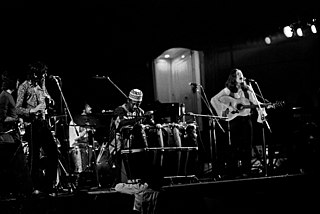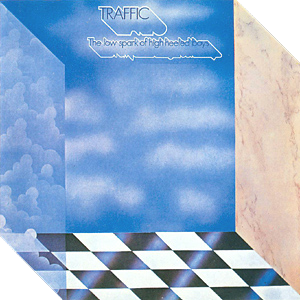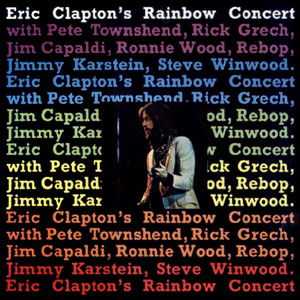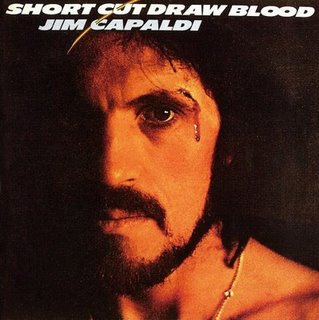
Traffic were an English rock band formed in Birmingham in April 1967 by Steve Winwood, Jim Capaldi, Chris Wood and Dave Mason. They began as a psychedelic rock group and diversified their sound through the use of instruments such as keyboards, sitar, and various reed instruments, and by incorporating jazz and improvisational techniques in their music.

Stephen Lawrence Winwood is an English musician and songwriter whose genres include blue-eyed soul, rhythm and blues, blues rock, and pop rock. Though primarily a guitarist, keyboard player, and vocalist prominent for his distinctive soulful high tenor voice, Winwood plays other instruments proficiently, including drums, mandolin, bass, and saxophone.

Traffic is the second studio album by the English rock band of the same name, released in 1968 on Island Records in the United Kingdom as ILPS 9081T (stereo), and United Artists in the United States, as UAS 6676 (stereo). The album peaked at number 9 in the UK Albums Chart and at number 17 on the Billboard Top LPs chart. It was the last album recorded by the group before their initial breakup.

Nicola James Capaldi was an English singer-songwriter and drummer. His musical career spanned more than four decades. He co-founded the progressive rock band Traffic in 1967 with Steve Winwood with whom he co-wrote the majority of the band's material. He was inducted into the Rock and Roll Hall of Fame as a part of Traffic's original lineup.

You Can All Join In is a budget-priced sampler album from Island Records released in 1969. Priced at 14 shillings and 6 pence (£0.72), it reached no. 18 on the UK Albums Chart.
"The Low Spark of High Heeled Boys" is the title track from the 1971 album by British rock band Traffic, written by Jim Capaldi and Steve Winwood. Despite never being released as a single due to its long duration, it became a staple of North American AOR-format FM radio stations in the 1970s and still receives airplay on classic rock radio today.

The Low Spark of High Heeled Boys is the fifth studio album by English rock band Traffic, released in 1971. The album was Traffic's most successful in the United States, reaching number 7 on the Billboard Top LPs chart and becoming their only platinum-certified album there, indicating sales in excess of one million. However, it failed to chart in the United Kingdom. The album features the minor hit "Rock & Roll Stew" and the title track, which received heavy FM airplay.

Christopher Gordon Blandford Wood was a British rock musician, best known as a founding member of the rock band Traffic, along with Steve Winwood, Jim Capaldi and Dave Mason.

Shoot Out at the Fantasy Factory is the sixth studio album by English rock band Traffic released in 1973. It followed their 1971 album The Low Spark of High Heeled Boys and contained five songs. Shoot Out, while achieving poorer reviews than its predecessor, did reach number six on the Billboard Pop Albums chart, one space higher than Low Spark had peaked in 1972. Like its predecessor, the original jacket for the Shoot Out LP had its top right and bottom left corners clipped. The album was remastered for CD in 2003.

Eric Clapton's Rainbow Concert is a live album by Eric Clapton, recorded at the Rainbow Theatre in London on 13 January 1973 and released in September that year. The concerts, two on the same evening, were organised by Pete Townshend of the Who and marked a comeback by Clapton after two years of inactivity, broken only by his performance at the Concert for Bangladesh in August 1971. Along with Townshend, the musicians supporting Clapton include Steve Winwood, Ronnie Wood and Jim Capaldi. In the year following the two shows at the Rainbow, Clapton recovered from his heroin addiction and recorded 461 Ocean Boulevard (1974).

Anthony "Rebop" Kwaku Baah was a Ghanaian percussionist who worked with the 1970s rock groups Traffic and Can.
Mick Weaver is an English session musician, best known for his playing of the Hammond B3 organ.
Rosko Gee is a Jamaican bassist, who has played with the English band Traffic on their album When the Eagle Flies (1974); with Go featuring Stomu Yamashta, Steve Winwood, Michael Shrieve, Klaus Schulze and Al Di Meola; and with the German band Can, along with former Traffic percussionist Rebop Kwaku Baah, appearing on the albums Saw Delight, Out of Reach and Can. He toured with Can in 1977 and also provided vocals for some of the band's songs during this period.

Welcome to the Canteen is the first live album by English rock band Traffic. It was recorded live at Fairfield Halls, Croydon and the Oz Benefit Concert in the canteen of the Polytechnic of Central London London, on 3 July 1971 and released in September of that year. It was recorded during Dave Mason's third stint with the band, which lasted only six performances.

On The Road is the second live album by English rock band Traffic, released in 1973. Recorded live in Germany, it features the Shoot Out at the Fantasy Factory band, with the Muscle Shoals Rhythm Section of keyboardist Barry Beckett, bassist David Hood, and drummer Roger Hawkins.

Steve Winwood is the debut solo studio album by blue-eyed soulster Steve Winwood. It was released in 1977, three years after the break-up of his former band, Traffic. Though the album sold moderately well in the US, it was a commercial disappointment compared to Traffic's recent albums, peaking at number 22 on the Billboard albums chart. In the UK, where Traffic's recent albums had only been moderately successful, Steve Winwood reached number 12 on The Official Charts. Island Records released two singles from the album, "Hold On" and "Time Is Running Out", both of which failed to chart.

Oh How We Danced is the debut studio album by the British musician Jim Capaldi. The album was recorded while Traffic was on hiatus due to Steve Winwood's struggles with peritonitis and was released by Island Records in 1972. Like his contemporary albums with Traffic, it was unsuccessful in his native United Kingdom but did better in the United States, reaching number 82 in the Billboard 200 chart and producing the hit single "Eve", which reached number 91 in the Billboard Hot 100.

Whale Meat Again is the second studio album by the British musician Jim Capaldi, released by Island Records in 1974. Like his first solo album, it failed commercially in his native United Kingdom but did better in the United States. With help from the opening track, "It's All Right", which spent seven weeks in the Billboard Hot 100 and peaked at number 55, the album reached number 191 in the Billboard 200.

Short Cut Draw Blood is the third studio album by the British musician Jim Capaldi, released by Island Records in 1975. It marked a major turning point in Capaldi's career: it was his first album recorded after the breakup of Traffic, and more importantly it was his commercial breakthrough. While Capaldi's first two solo albums had been moderately successful in the United States, Short Cut Draw Blood entered the charts in several other countries for the first time. This was particularly evident in his native United Kingdom; the single "It's All Up to You" at number 27, released a year before the album, became his first top 40 hit there, only to be overshadowed the following year by his cover of "Love Hurts", which went all the way to number 4.

Fierce Heart is the eighth solo album by British musician Jim Capaldi. The album has a far more synth-heavy approach than any of his previous albums, though the songs are mostly in the same aggressive rock/pop vein that Capaldi had long been associated with. This synth-heavy pop sound was exactly what 1980s audiences were looking for, and the songs "That's Love" which broke the top 40 in the US at number 28, and "Living on the Edge" at number 75, became hit singles. The album itself reached number 91 on the Billboard 200.
















